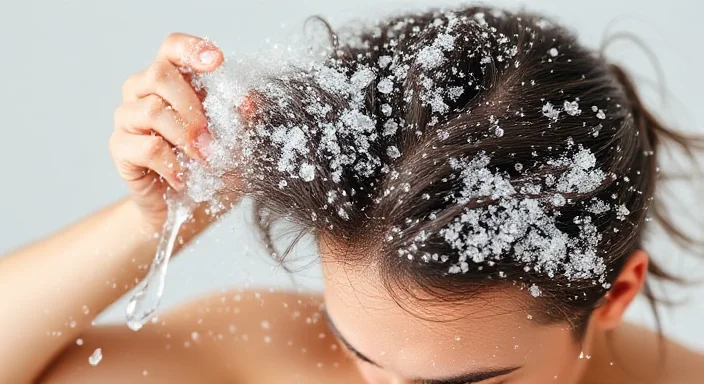Anti-Dandruff Shampoos: Combat Flakes and Soothe Your Scalp

Introduction
Dandruff, characterized by white, flaky skin on the scalp, is a common hair and scalp condition. While not always serious, it can be itchy, embarrassing, and even lead to hair loss in severe cases. Anti-dandruff shampoos are specially formulated products designed to combat this issue.
Understanding Dandruff
Dandruff is primarily caused by an overgrowth of a naturally occurring yeast called Malassezia. This yeast thrives on the scalp’s natural oils, leading to inflammation and increased skin cell turnover. The result is the visible flakes we associate with dandruff.
How Anti-Dandruff Shampoos Work
These shampoos contain active ingredients that target the root cause of dandruff:
- Antifungals: Ingredients like ketoconazole, zinc pyrithione, and selenium sulfide kill the Malassezia yeast, reducing inflammation and flaking.
- Exfoliants: Salicylic acid and coal tar help remove excess dead skin cells from the scalp, preventing flakes from building up.
- Anti-inflammatory agents: Some shampoos contain ingredients like tea tree oil or pyrithione zinc, which can reduce inflammation and soothe the scalp.
Key Ingredients in Anti-Dandruff Shampoos and Their Benefits
- Ketoconazole: A powerful antifungal agent that treats severe dandruff by eliminating Malassezia yeast. It’s often found in prescription-strength shampoos.
- Zinc Pyrithione: A milder option effective for reducing flakes and soothing the scalp. It’s ideal for everyday use.
- Selenium Sulfide: Targets dandruff by slowing down cell turnover and preventing yeast overgrowth.
- Coal Tar: Slows the skin cell shedding process and reduces scaling, particularly beneficial for severe dandruff or conditions like seborrheic dermatitis.
- Salicylic Acid: A beta-hydroxy acid (BHA) that gently exfoliates the scalp, helping to remove dead skin and buildup.
- Tea Tree Oil: A natural antifungal and antibacterial ingredient that soothes irritation and prevents dandruff.
Choosing the Right Anti-Dandruff Shampoo
The best anti-dandruff shampoo for you depends on the severity of your dandruff and your scalp’s sensitivity.
- Mild Dandruff: Over-the-counter shampoos with zinc pyrithione or selenium sulfide are often effective.
- Severe Dandruff: If over-the-counter options don’t work, you may need a prescription-strength shampoo containing ketoconazole.
- Sensitive Scalp: Look for shampoos labeled “gentle” or “for sensitive skin.” They may contain milder ingredients or be free of fragrances and dyes.
Using Anti-Dandruff Shampoo
- Follow the instructions: Different shampoos have different instructions, so always read and follow the directions on the bottle.
- Apply to wet hair: Massage the shampoo into your scalp for a few minutes to ensure it reaches the affected areas.
- Leave it on: Some shampoos need to be left on for a few minutes before rinsing.
- Rinse thoroughly: Make sure all the shampoo is rinsed out of your hair to avoid irritation.
- Use regularly: Most anti-dandruff shampoos need to be used regularly to maintain results.
Benefits of Anti-Dandruff Shampoos Beyond Flake Control
- Scalp Hydration: Some formulations include moisturizing ingredients like aloe vera and glycerin to combat dryness.
- Hair Strengthening: Many anti-dandruff shampoos also include proteins and vitamins to strengthen hair strands.
- Prevention of Hair Thinning: By treating underlying scalp issues, these shampoos can minimize hair shedding caused by irritation.
- Color-Safe Options: Specialized formulas for color-treated hair maintain vibrancy while addressing dandruff.

Additional Tips for Managing Dandruff
- Avoid harsh hair products: Harsh shampoos, conditioners, and styling products can irritate the scalp and worsen dandruff.
- Keep your scalp clean: Wash your hair regularly with a gentle shampoo and conditioner.
- Don’t scratch: Scratching can irritate the scalp and make dandruff worse.
- Moisturize your scalp: Dry scalp can contribute to dandruff, so consider using a moisturizing scalp treatment.
- See a dermatologist: If your dandruff is severe or doesn’t improve with over-the-counter treatments, see a dermatologist for diagnosis and treatment options.
Tips for Maximizing the Effectiveness of Anti-Dandruff Shampoos
- Alternate Shampoos: For chronic dandruff, alternating between different types (e.g., one with ketoconazole and one with salicylic acid) may improve results.
- Consistency is Key: Use the shampoo as directed for at least 4-6 weeks to see significant improvement.
- Scalp Massage: When applying the shampoo, gently massage your scalp with your fingertips to stimulate circulation and improve product penetration.
Homemade Scalp Treatments to Complement Anti-Dandruff Shampoos
- Apple Cider Vinegar Rinse: Balances scalp pH and reduces fungal growth.
- Coconut Oil with Tea Tree Oil: Hydrates the scalp while addressing fungal infections.
- Aloe Vera Gel: Soothes irritated skin and provides hydration.

Conclusion
Anti-dandruff shampoos are effective in managing dandruff for most people. By understanding the causes of dandruff and choosing the right shampoo for your needs, you can effectively control this common condition and enjoy a healthy, flake-free scalp.



